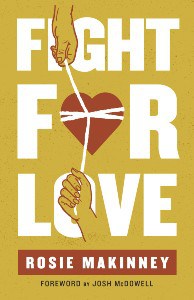John Fuller: Today on Focus on the Family, we’re returning to a really serious, uh, heartbreaking issue that is putting many marriages at risk today, and, uh, it’s a topic that’s not going to be suitable for younger listeners.
Rosie Makinney: So even though for my eyes it looked like everything had fallen to ruins and as though this great divine cosmic trick had been played on me, I still couldn’t release that hope, that fear, that actually He had a plan-
Jim Daly: Yeah.
Rosie: … He had a plan, and I just had to hang on, just had to stick with it, and be, um, brave and look at my own stuff.
John: What do you do when, uh, in your marriage, there’s a defining moment? It’s a hard moment. Uh, you look to God. And that’s Rosie Makinney saying you can trust God in those moments, especially as it relates to the impact of pornography on your relationship. Rosie and her husband, Mark, are here, um, with that hope that God can heal. And your host is Focus president and author, Jim Daly.
Jim: Hey, John, we had a powerful conversation last time with Mark and Rosie, uh, who have lived through the pain and shame and the recovery process from pornography. And today, they are helping many, many other couples climb out of the pit of despair to live and love each other in the ways God intended for them to do. Uh, as we learned last time, pornography can hijack your brain. It’s an addiction, and we need to recognize that. Uh, users become addicted to the point where you can think of nothing else. It kind of consumes your thoughts throughout the day and the evening. We also discussed how pornography is hurting Christian marriages particularly today, and this is a serious crisis that we have to hit head-on in the church. You might be saying, “Why are you covering this? You’re Focus on the Family.” Believe me, these are the things we need to discuss, so that our families are healthy. And it’s the enemy, in my opinion, that puts the thought into our head, to keep this kind of quiet and in the secret place.
John: Mm-hmm.
Jim: Let’s talk about it. I mean, God gave us the gift of sexual interaction in the context of marriage. I wanna celebrate that. I don’t wanna hide from that. But man, can it be manipulated by our flesh and the enemy of our soul. And that’s why we’re gonna hit this topic today and give you hope that you can write these things in your life. Not through your own power, but in the power of Christ. And remember, Focus on the Family is here to help you get there. And not only Rosie’s great book, Fight For Love, but our counseling department and so many other resources are here to help you begin that journey of healing.
John: Mm-hmm. And Jim, we were in a meeting recently in which our counseling team shared the top reasons that people call Focus on the Family. Pornography is right up there, one of the top, ongoing concerns. So if you’re struggling with this, give us a call and, uh, we’ll schedule a time for you to talk to a counselor. Our number is 800, the letter A, and the word FAMILY, or stop by focusonthefamily.com/broadcast. Rosie Makinney has a ministry to families, to couples, uh, to deal with this, uh, this matter. Uh, it’s called Fight for Love, the same title as her book. She has a podcast with that title as well, and, uh, she works to empower and equip women in particular to fight against porn addiction in their marriages and families. And Mark has worked as a sexual addiction therapist for more than 10 years, uh, with hundreds of couples and individuals. And Jim, they were very authentic and raw and very candid last time.
Jim: I love it. And I think the reason is because they know there’s hope, uh, for redemption.
John: Mm-hmm.
Jim: That’s the message of the Gospel. So they’re living it in a very tough spot, this idea of sexual addiction, porn addiction. And it’s not the easiest thing in the world to lay out on the table for everybody to talk about. But I so admire their courage and willingness to do it, because so many couples are dealing with this. And Mark and Rosie, let me welcome you back to the discussion. Thank you for being here.
Mark Makinney: Thank you. Great to be here.
Jim: Yeah.
Rosie: Good to be back.
Jim: I so appreciate your courage. I really mean that. I mean, it’s, it’s… This is a tough topic, and I’m so glad you’re willing to write about it, do the podcast that you do about it, talk, to actually become a licensed counselor to help couples dealing with it. That is awesome.
Rosie: Well, here’s the thing, Jim. It’s a privilege because it’s so easy to help people. You literally just tell a bit of your story, say, “There’s hope, there’s help, you’re not alone,” and people think you’re amazing. So, really-
Jim: Let me, yeah-
Rosie: … it’s, it’s kind of a gift, really.
Jim: … let me ask you this, though, what… This is where I think the Christian community really makes an error, that we try to project perfection-
Rosie: Mm-hmm.
Jim: … rather than brokenness. And when we do that, people go, “Uh, I can’t. Uh, that’s not me.” When you do what you’re doing, “This is how we were broken, this is what we are dealing with behind the closed doors of our lives,” people go, “Wow, that’s what I’m suffering with.” And they connect to it. That’s what I love about your story. It’s real.
Rosie: Yeah.
Jim: So, it’s awesome.
Mark: What I- what I love when we walked in today, Jim, it said outside the doors of Focus on the Family: “Give the glory, God.” Right? And what you said earlier is so perfect. And, and I have a question. Is the cross enough?
Jim: Absolutely.
Mark: Is it- is it enough to save somebody who’s addicted to porn?
Jim: Yes.
Mark: Of course, it is.
Jim: Yeah, anything. Even from your own, uh, pride. Another one.
Mark: Amen.
Jim: Yes. You know, with all the failure in Christian leadership, I- I kind of deduced it to three core things: pride, sex, and money. And that’s been true for, like, 3,000 years, and it’s recorded for us in scripture. So certainly, as Christian leadership, we gotta say, “Okay, what are we gonna do to avoid these pitfalls of pride, sex, and money?”
Mark: Right.
Jim: And man, I’ll tell you. Pride is equally as ensnaring. And what I mean by that in terms of the pride is, like, the guys that have it bolted down. “I’m never gonna have an affair. I won’t be addicted to pornography. I’ll never take money.” And they’re very proudful of that and then they look down like a pharisee on the rest of, uh, the faith-filled people-
Rosie: Yeah.
Jim: … who are struggling, too. So it’s just, it’s where we’re at. Be humble. (laughs) Right?
Rosie: And this is the most humbling thing, especially for women, because we stay in the shadows, if we’re honest, for longer than we need to, because we don’t wanna destroy that image-
Jim: Yeah.
Rosie: … that have actually managed to catch a really good guy. Um, our family’s got it all going on. And it’s really hard.
Jim: Yeah.
Rosie: It’s really hard to go-
Jim: Well-
Rosie: … “Actually, we’re just a mess like everybody else.”
Jim: And that sense of failure, every direction.
Rosie: Yeah.
Jim: For the guy that’s addicted, for the woman trying to help her husband.
Rosie: Yeah.
Jim: I mean, it’s, it’s a mess. Uh, we shared last time that you two have lived through this addiction and the recovery process. Let’s… For the new listeners and viewers, uh, take us through the key points of that process, which involves disclosure. You use also an impact letter and some serious counseling, obviously. Explain, uh, each step of that process.
Mark: The most important thing is that the guy be brought into the light. That’s the most important thing. And the things I say to guys when I first call them, when they first call me is, “I will not work with a guy unless he’s willing to do a disclosure to his wife and get into a good group.” And I really wanna emphasize, a lot of groups are too vague and too this and too that. You need… Why is that? Because if the healing process only takes place when he’s actually walking the light. So a disclosure has to be managed pretty carefully in that you don’t wanna disclose thought life. That’s just something that sometimes guys do. They kind of vomit up the kitchen table. Um, but you wanna be very thorough about your behavior, so that your basement is clean, so the devil doesn’t have any, “If they only knew this about you, they wouldn’t love you,” kind of thing. You wanna clean your basement. That’s disclosure.
Jim: Yeah. Tell me why it’s so critical for porn addicts to understand the full extent of the pain they’ve inflicted on their spouse and family because they believe this lie that, “That really doesn’t affect anybody but me. And this is just a quiet-”
Mark: Right.
Jim: “… this is a little problem I’ve got.”
Mark: Right.
Jim: “But my wife’s fine.”
Mark: Right, well, s- it hardens your heart. Pornography’s a sign. It hardens your heart.
Jim: Even sounds like it, doesn’t it?
Mark: It do-
Jim: When I say it that way.
Mark: Yeah, totally.
Jim: Yeah.
Mark: Because what happens is, guys, they become unempathetic. Empathy’s gone. And they- they’re self-absorbed because they think that, “Well, it’s only between me and God.”
Jim: Yeah.
Mark: You know, and it- and it’s not true. So, I always say to guys, “Your pai- your wives’ pain and anger and sorrow and grief and even hopelessness is your medicine.”
Jim: Yeah.
Mark: That’s what’s God using to actually soften your heart and give you a heart of flesh.
Jim: That impact letter, or disclosure… Give us a few more highlights of that. That’s- that’s gotta be just incredibly difficult to do.
Mark: Yeah, and-
Jim: And to read, as the spouse.
Mark: … I would say wives often find… Some find it easy because they finally have a voice. Others find it hard because they don’t wanna go there. They don’t wanna go to the fact that the- you, your behavior… And remember what Rosie said about our story. It’s not just the sexual behavior. What made her draw that line was all those… my anger, my criticism, all that other stuff. So in an impact letter, a wife will describe to the husband, “This is what your behavior, your flesh, has done to me.”
Jim: Huh.
Mark: And it’s important for the wife to get that out, because I don’t want the wife to- to have an abscess, in a way, of- of dark emotions. I want them to get it out into the light. But I also, I really want the husband to hear… You know what I do? This might seem a little odd, but I make the husband read… There’s 21 questions on a partner survey, and then they do the impact… I make the husband read one a day out loud to the wife with their answer, and say to the wife, “Thank you so much for your honesty. That was very brave, and is there anything more you wanna say?” ‘Cause I want this guy… It’s not a one and done. I want this guy to absorb the pain of their wife.
Jim: Yeah. Boy, just hearing that. I mean, it makes me heavy-hearted just thinking about that, you know. Wow. Rosie, uh, recovery from a pornography addiction isn’t, uh, always a one and done process. Um, sometimes there’s that relapse factor, like Mark described yesterday. You know, “Lord, I got this in hand. I sorry I blew it last night, but I’m committed today.” And then tonight comes, and it’s a relapse. Uh, explain what a safety plan is, and why a spouse needs a safety plan for relapsing?
Rosie: Yeah, great point. We so want recovery to be a straight trajectory upwards, but it’s really more like spaghetti, and you’re just going round and round, and up and down. Um, and it’s so important to plan for what you’re going to do if he does relapse. They’re not inevitable, but they happen. And to plan what you’re going to do, so just like the safety drill on a plane. You know, if we start to go down, we’re gonna… The oxygen masks are gonna drop. These are things you’re gonna need. So if your husband does have a slip in his acting-out behavior, um, you’re gonna need probably emotional space, maybe physical space. You’re gonna need to call people, um, and you’re gonna need to put things in place so you actually do those boundaries because your fear is gonna be off the chart, and you…The person who you need the most in the world is the one who’s just hurt you again. So it’s really hard to have boundaries because you want a hug. You- you- you want the comfort from that person, even though they’ve just hurt you. So you need the sanity of your fellowship to go, “Nope.” You need to stick to your boundaries. Go back to your safety plan. What does it tell you? ‘Cause the safety plan is not about consequences that will happen if you act out. It’s not punitive. It’s like, “This is what I’m gonna need. I’m gonna need space to actually process this new level of hurt.” Um, but also you need your- your fellowship around you to reframe it as, “This is an opportunity. This is awful that this has happened. I’m really sorry this has happened. However, let’s look at how you’re moving forward. Did he confess within the allotted time? Is the deception part of this getting less?” Because that’s what you want. You know, he can’t control the acting out, the lust in the same way as he can control the deception. So you’re looking progress in that, to- to begin with. You know, is he being transparent with you? ‘Cause that’s what makes you feel safe. That’s what enables you to start putting down those- those pebbles of trust. Like, “I can see that he’s working really hard, and he’s struggling, and yes, he’s messed up again. But he told me. He’s not hiding anything. He’s not letting me sit for two weeks thinking I’ve done something because he’s being distant.” That was the thing that used to really irritate me. He’d go distant, and I’d think, “It must be me, it must be me,” and beat myself up. And then it when it comes out that, actually, no, he’d just done something, the anger would be off the chart because not only what he’d done, and the betrayal, but the fact I’d beaten myself up for two weeks.
Jim: Right.
Rosie: And that is, like, oh, oh-
Jim: Undeserved emotion.
Rosie: Yeah, and that’s when-
Jim: Yeah.
Rosie: … you- you feel retaliatory, and you wanna hurt them back because you… “Don’t mess with my sanity-”
Jim: Yeah.
Rosie: “… and my recovery just because you’re not being honest.”
Jim: Boy, and in all of that, God going, “Hey, you two, look at Me.”
Rosie: Absolutely.
Jim: “Look at Me.” (laughs) You know? Wow, there’s so much going on.
Rosie: Yeah.
Jim: Emotionally.
Rosie: So much going on.
Jim: Uh-
Rosie: It’s exhausting.
Jim: … it’s- it’s- it’s-
Rosie: (laughs)
Jim: … gotta be a bit overwhelming. Um, let’s speak to this idea of disclosure, full disclosure. You mentioned it a moment ago about, you expect that man who’s in this situation to not vomit it all out, but to give full disclosure. Describe the parameters of that.
Mark: I give them 10 questions. So it’s unkind… Remember, just like a safety plan. When someone’s in that state of either just acting out or coming into recovery, their brain is not working well. Their emotions are all over the place. So it’s unkind to give them a sheet of paper and say, “Okay, Bill, you do it.” So I give them 10 questions.
Jim: Okay.
Mark: And then I go over those 10 questions with them. To make sure… Another thing guys do inherently is minimize and be vague. So they’ll say, “I don’t know, uh, a little bit, a lot, sometimes.” And so I get all that language out of there, and try to get them to be as specific as possible about how, when, where, what?
Jim: That… I mean, that’s… and that’s a good place to start, right?
Mark: Yeah. I-
Jim: Just get it out there. Kinda like a police report (laughs).
Mark: Yeah, but the beautiful thing is, I say to guys. I go, “Hey, this is not punitive.” I don’t… This is redemptive. So, because it’s not about, you know, wha- it- it’s really about teaching his brain that, “Hey, dude, you cannot hide anything ever anymore again.” Because when you get all the nooks and crannies of your… Next time he wants to do this, I want his brain to be thinking, “I can do that, but I’m gonna have to disclose everything about it.”
Jim: Right.
Mark: And that’s- that kinda kills the buzz, honestly.
Jim: Right.
Mark: You know.
Jim: I- I think that’s actually a healthy place for men.
Mark: Yes.
Jim: Because again, eh, men inevitably, you know, we’re full of testosterone.
Mark: Right.
Jim: Thoughts are gonna happen. But when you have that accountability, that’s restrained.
Mark: Right.
Jim: Um, having the thought is one thing, acting on it is the problem.
Mark: And it doesn’t happen. You know, re- long-term relapses don’t happen if the guy’s in recovery, and- and connected to their support group. Because he’ll- they’ll say, “Hey, this girl at the office, you know, we talked.” And the guy will immediately go, “Dude, do not…” You know what-
Jim: Yeah.
Mark: … you… What- what you’re doing with- with support is you’re- you’re outsourcing your thinking.
John: Yeah. We’re talking today on Focus on the Family with Mark and Rosie Makinney, and, uh, I so hope that you’re gonna contact us for a copy of Rosie’s book, Fight for Love. Uh, that’s the name of her podcast and her ministry as well. We’ve got all the details at focusonthefamily.com/broadcast, or give us a call, 800, the letter A, and the word FAMILY.
Jim: Rosie, in the book, you also use an analogy between polar bears. Yes. And sheep. (laughs) So what’s-
Rosie: I think this is yours, Mark, isn’t it?
Jim: Oh, was this Mark’s?
Rosie: Oh, yes, this is…
Mark: So I say this to guys because it’s how God made us. So, what’s the healing process look like? Really, we have to live in accordance to the way we’re made. And by that, I don’t mean just tuck your shirt in and be sweet and nice. I love what you said earlier, Jim, about that we put on a façade. You know, so the façade of being self-reliant. I always say to guys, you know, the Jason Bourne movies.
Jim: (laughs)
Mark: Every dude wants to be that guy. Like, “I’m single-handedly taking on the government.” You know what I mean?
Jim: Yeah.
Mark: But, but we aren’t that. Jesus made us a sheep. So, and- and a child. And both of them are- are vulnerable and not thriving when they’re isolated.
Jim: No, that, it… That is so good, and it’s so true. It appeals to the male ego to think we can conquer the world, and, uh, and we’re that good. (laughs) Typically, we’re not.
Mark: Silver line. Silver line. Yeah.
Jim: Uh, you- you stress the importance of accountability in the recovery process. Some call that, uh, transformational community and openness. Uh, what does that look like? (laughs) And why is it so critical to be that way? Which, God must love a heart that’s transparent and open.
Mark: I mean, I would say too that what, um… If you are struggling with pornography, what that says about you is this. That you are actually in the category of people that Jesus came to save. He said, “I did not come to call the righteous to repentance. Uh, uh, the well do not need a physician.” So, I mean, I know it’s… I’m not minimizing porn use. It’s a bad one. But that’s all it says. So the accountability thing, what happens is, you actually discover the Gospel in a whole new way, ’cause now I can tell you all the goo… And not that grr is not just sexual acting out. It’s the fact that, you know, you resent your- your, uh, boss. You resent your kids or whatever. You can get that out there, and what you get back from the spirit of God through the body of Christ is mercy and grace and challenge. We need challenge too.
Jim: It’s what it should be.
Mark: Yeah, we- we can’t just… You know, the law came through most as grace, and truth came through Jesus.
Jim: Right.
Mark: Men need both.
Jim: Mm-hmm.
Mark: But that’s the power of the- the, uh, transformation groups.
Jim: You talk about an accountability partner. Um, you know, I’ve got a mentor that I talk to once or twice a month, and I’ve done that for the last 25 years. The one reality that when people talk about Christian leaders particularly, but everybody. You can get by with so much. You know, having a mentor, accountability partner, you have to be honest. It’s like what you put into the relationship is what you’re gonna get back. If you’re deceitful and cunning and manipulative-
Mark: Right.
Jim: … that person can’t really help you.
Mark: Right.
Jim: ‘Cause you’re gonna be lying to them.
Mark: Right.
Jim: But you do talk about the importance of an accountability partner. Describe who that person is, and how you maintain a healthy transparence in that relationship, so that person can actually be a benefit to your life.
Mark: Yeah, I mean, I assign guys a sponsor as well, and that’s somebody who’s further down the road. And that person usually is the one who has the capacity to cut them, and to, as I say, clean their mirror, so they can see themselves more clearly. And then in my group, I make the guys… I assign a different partner. But I make them call, uh, make three calls a week. Whether they’re in a good mood or bad mood. And if they had a great week, I just say, “Wait till somebody cuts you off in traffic, then make your call.” ‘Cause I want to do is I want to get them into habit of what it means to actually conduct your life in the light and expose these things. So when that moment comes, when you are tempted with lust, you will have practiced that kind of vulnerability before.
John: Mm-hmm. Mark, in your own story, it seems like, uh, maybe some of this was in your own recovery. How much of it, uh, wasn’t, and that’s why you’re so passionate about accountability and transparency and a mentor?
Mark: Yeah, I mean, I tell guys that I’m… You know, God allowed me to be the bleeding woman, you know, that spent all the resources I had and got nowhere.
John: Mm-hmm.
Mark: So, and I- I openly say to guys, “Hey, I’m the master of what doesn’t work.” Because I- I did ’em all. Like, “Well, I’m gonna do this, I’m gonna read a book.” No, you can try that. God can do anything, you don’t want to limit Him. But I know what works from experience, and what doesn’t work. You know what I mean?
John: Yeah. So a book didn’t help and-
Mark: And I- I put filters on, and I did all that. Or I… E- even the accountability partner thing, where you call ’em once a week. What happens is, you- you’re masking. So you’re like, “Hey, I did act out on Tuesday, but I feel really re-…” That’s not the kind of walking the light that the Bible talks about. What it talks about is raw accountability. So you call when you wanna act out, before you act out.
Jim: Ah.
Mark: And then all the kinda grit, and, “Well, wa-… What’s going on?” “Well, my kids, and my wife, and my boss, and…” Eh, you know, all that stuff comes out. That’s what we need. We need that kind of- of level of transparency.
Jim: Wow, no, that’s good. That’s a good point. Call when you’re about to fall.
Mark: Yeah.
Jim: So that they can help you-
Mark: Yeah.
Jim: … not fall.
John: Mm-hmm.
Mark: Yeah, be raw. Yeah.
Jim: Yeah, that’s good. That’s good vulnerability. Uh, let’s move toward closing. We got a couple more questions here, but, um, you know, you’ve gone through it. And Mark, particularly, but I want to hear from you in a moment, Rosie. Uh, you stated that God often, uh, doesn’t miraculously fix things. By reading a book, just a book. But it can be a combination of things, and for people to find out more, they should get the book, Fight for Love. And, uh, that will help you. But describe, uh, 2 Corinthians 12:9, I think, which is an important scripture for you. And how it has fit into this process. “My grace is sufficient for you, my power is made perfect in weakness.”
Mark: Oh, yeah, beautiful. I mean, think about how beautiful that is. You guys, I mean, I always feel like I spent my life wanting desperately to be a pharisee. Like, “Please, Jesus, make me a pharisee. Make me good so that other people can look up to me. Make me wise, so that other people can look up to me. So that I don’t really need you.” Now, I never said that out loud.
Jim: Right. (laughs) I’m sitting here going, “What?”
Mark: But that’s what I wa-
Jim: “What did he say?”
Mark: … no, I mean, but that’s what my heart was.
Jim: Yeah.
Mark: You know.
Jim: Wow.
Mark: And I love Jesus, that He did not give me a quick answer, because He said… What I felt… I didn’t hear voices, by the way. But what I felt in my heart was, “I’m the Lord, and you are not. You’re my servant. I’m not your servant. And you’ll do it My way. And My way is, I want you to be transparent with…” With like Paul says, think about Romans 7, you know, Paul says, “When I want to do good, evil’s right there with me.” I- I am transparent with my failings, so that I can point to Jesus. ‘Cause if He can save somebody like me, He can save you. That’s what I want to say to guys.
Jim: Yeah, so good. Rosie, coming back to you now. Describe your marriage today. What is different? What gives you oxygen now? Uh, how do you feel in terms of your emotional intimacy with Mark? If I could ask that question-
Rosie: Yeah.
Jim: … I’ll ask your permission first.
Rosie: I feel seen.
Jim: Huh.
Rosie: And I feel able to be all aspects of myself. Like, the good, the bad, the ugly. Um, and that’s so powerful. And I’m able to take that into friendships. Um, and have that in other fellowship. I… There’s just a level of, um, trust now, that even if we have a, you know, a discussion, a heated discussion about something, I know that within 10 minutes, 20 minutes, an hour, he’s gonna apologize, and then I’m gonna apologize. I know that’s gonna happen. It’s just a very solid foundation because, um, there’s no pretense anymore, which gives you great freedom.
Jim: Yeah.
Rosie: Um-
Mark: Freedom.
Rosie: And that’s beautiful. There’s no hiding.
Jim: Yeah.
Rosie: And- and even if I want to hide, I can say, “I don’t wanna interact with you right now. I wanna be hide, and I wanna isolate.” I can actually communicate that. So that’s beautiful, isn’t it?
Jim: It is.
Rosie: It’s… yeah.
Mark: The freedom is wonderful.
Rosie: The freedom.
Jim: Yeah.
John: Mm-hmm.
Jim: Well, boy, the thread that I’ve heard throughout last time and today is just… There’s something that you recognized early on, which is, there’s still hope. And we’re all sinners.
Rosie: Mm-hmm.
Jim: And, you know, sometimes in that situation, uh, the wounded spouse can just focus on the other person. And their, uh, shortcomings, and their sin. And I think it’s refreshing to hear that you were able, as the wife, to both say, “Okay, wait a minute. His brain’s not in a good place.”
Rosie: Yeah.
Jim: “He needs healing, and I’m willing to move with him.” That’s not always the response-
Rosie: No.
Jim: … that will be there.
Rosie: And there’s different levels of trauma. So I would say, the ability to turn around and look at your stuff, for me, it was able to happen quite early, just because of our circumstances, not ’cause there’s anything particularly wise or self-aware about myself. Um, it depends. It depends, the level of the trauma that you’re going through. You’re- you’re not even able to think straight for a really long time if, you know, you’ve just had this horrendous disclosure, and your whole world has imploded, and you- you can’t think straight. And your body’s falling apart, and you don’t know what’s right, and… So you’re going to need to heal from that, and then with the right supports and guidance and hope, you need people around you to hold hope. Then, gently, gradually, you can start to look at your own stuff.
Jim: Yeah.
Rosie: And that’s where you’re able to see your partner as an equal.
Jim: Yeah.
Mark: Jim, there was a moment. I remember, it was, like, after a couple of months, and it’s kind of humorous. But when Rosie turned to me one morning, and said, “I married you.”
Rosie: (laughs)
Mark: And it was really… I mean, and- and believe it, I took it as a… ‘Cause she was think- what she meant by-
Jim: Yeah. Y- the enunciation is really important. (laughter) I married you?
Mark: You? (laughter)
Rosie: No, it was more, “I’ve…” like-
Mark: Yeah. I know, it’s great.
Rosie: What happened?
Mark: Yeah. I mean-
Rosie: Like-
Mark: … it’s awesome.
Rosie: Whoa.
Mark: But that was her moment of, like, “Okay, so…” And she’s right. Uh, um, I don’t make wives do that in the first… You know, you can’t do that. Like, “Okay, you gotta look at yourself.” I think that’s not right. But, you know, when she said that is when we started to walk as partners holding hands down the path of, “We are both… we both need Jesus.”
Jim: Yeah.
Rosie: Yeah.
Jim: Well, and what’s so beautiful is, you know, again, there’s not a formula, but there’s ingredients that are required-
Mark: Right.
Jim: … for a good outcome-
Mark: Right.
Jim: … a godly outcome.
Mark: Right.
Jim: Humility by both is one of them.
Mark: Right, yeah.
Jim: Um, and you, then you keep moving from there, knowing who you are in Christ, a sinner, broken, both of you. And then accepting Christ and moving with him toward healing. That’s what we’re talking about. So, this has been so good. I mean, we could keep talking about this, but you guys have done such a wonderful job expressing it. And I really appreciate your vulnerability and honesty today. Now, if this conversation has impacted you, the listener, I hope you’ll reach out to us. Uh, we mentioned last time that we have caring Christian counselors who can help if this is an issue in your marriage. We also have Rosie’s book, Fight for Love, which we can send to you. And then I’d like to invite you to partner with Focus on the Family, especially now, as we approach the holiday season, and the end of the year. This is a critical time for our ministry’s budget, and we’re counting on friends like you to help provide the fuel that we need to strengthen marriages and equip parents, save pre-born babies from abortion, and so much more, as we head into next year. Right now, we have a matching gift campaign where any donation you make will be doubled, and that’s a great deal for all of us. You send a gift to Focus, and we have some wonderful friends who will match that dollar for dollar. And it does give families hope for 2024. And we’ll say thank you by sending you a copy of Rosie’s book. It’s a win-win for everyone.
John: It all begins with your phone call today. Our number is 800, the letter A, and the word FAMILY. 800-232-6459. And, uh, you can make a donation and double your gift, and get your copy of the book, Fight for Love, when you call. And of course, we’ll connect you with a counselor, if that’s helpful for you, as well. You can also find details at our website, and that’s focusonthefamily.com/broadcast. And coming up tomorrow, we’ll hear from Kirk Cousins. He’s playing in the NFL as quarterback for the Minnesota Vikings. And you’ll hear how the Gospel influenced his life.
Kirk Cousins: And I decided in that moment, okay, that’ll be my life first, and I’m gonna truly live that. I’m gonna trust and obey Him, even when it’s hard, and I don’t feel like it. And we’ll see where He wants to steer the ship. It might not be football, but let’s let Him steer the ship, not me. And I’m not gonna worry about it.























